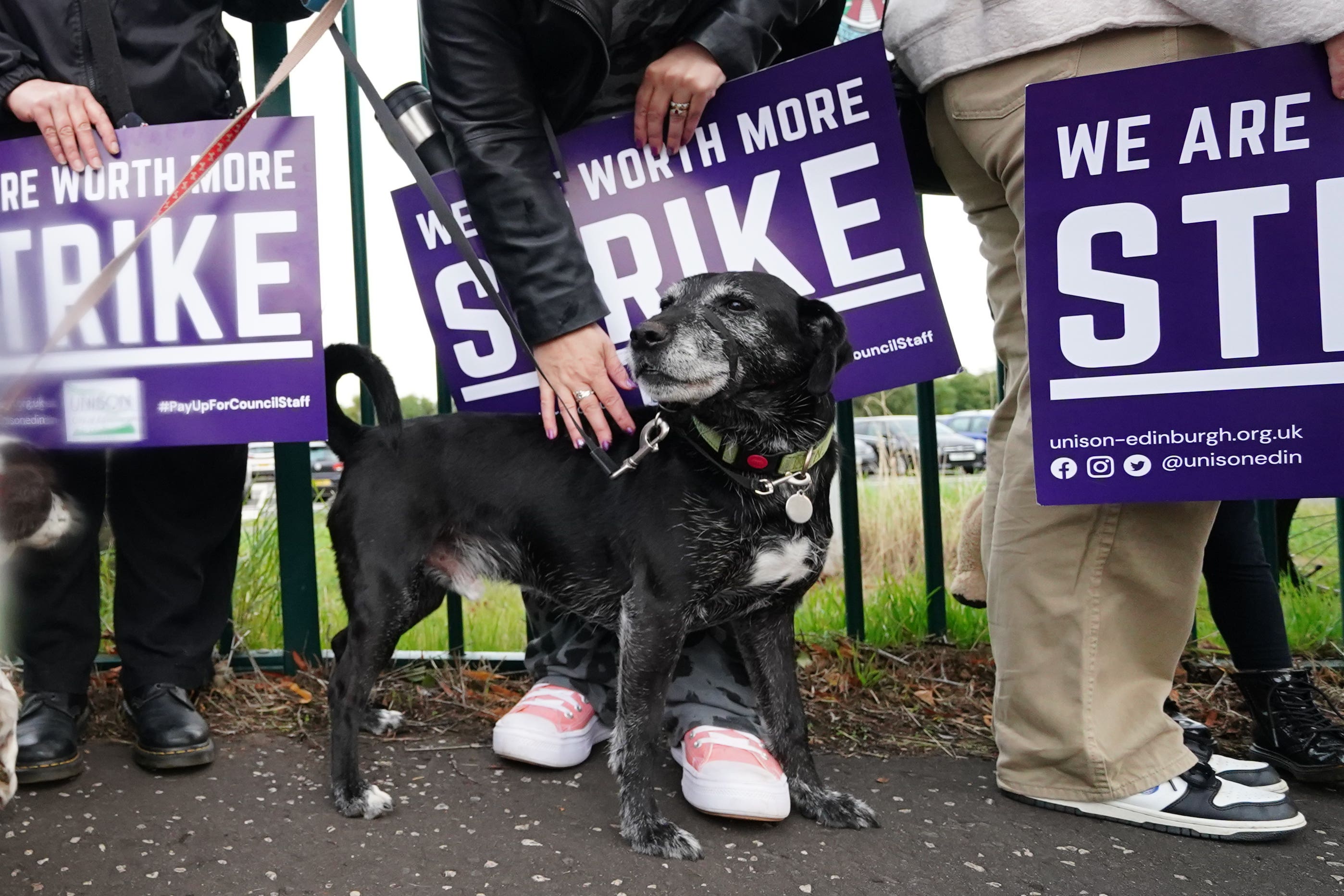School staff on strike over pay say they use own money for class resources
Unison members in support roles in Glasgow, Inverclyde, Renfrewshire and East Renfrewshire walked out for the day on Wednesday.

School support staff on strike in Scotland as they demand pay of £15 an hour have told how they use their own money to buy work equipment.
Unison members in school support roles in Glasgow, Inverclyde, Renfrewshire and East Renfrewshire walked out for the day on Wednesday.
Some gathered on Buchanan Steps in Glasgow for a rally after braving torrential rain on the picket lines outside their schools earlier in the day.
They told how some spend half the month overdrawn, and could get better paid jobs in a supermarket.
Karis McDermott, 21, a support for learning worker, said she gets £1,200 per month after tax, which includes pay for additional responsibility for caring for children with life-threatening health conditions in a peripatetic role around several schools.
Her colleagues who work in the same role without additional responsibility pay get £1,068 per month.
Miss McDermott, along with colleagues Lynn McAreavey, 62, and Lesley Johnston, 60, work in the same role at a school in Govanhill, Glasgow.
They want to be paid as close to £15 per hour as possible, and said they find it difficult seeing Glasgow City Council spend money on revamping the city centre rather than investing in education.
Miss McDermott said: “We are expected to be social workers, nurses, psychologists, cleaners, as well as IT experts.
“They don’t have any money to pay us, but they are going to redo Sauchiehall Street and George Square.
“I’m in my overdraft two weeks after being paid, but bought whiteboard pens because there weren’t any – you have that sense of responsibility.”
The women said they have the support from teachers and senior management but fear local government body could impose a rejected pay offer regardless of Unison’s objection.
Mrs McAreavey, who has worked in her job for 18 years, said an increased focus on inclusion had not been matched with resources, and she could do a less stressful job with better pay working as a cleaner.
She said: “The teachers are sympathetic, they couldn’t do their jobs without us, and the headteachers are backing us.
“We could all go and get a job which has zero responsibility, no concerns, and get more for it. I saw a job advert recently for a cleaner which paid more.”
Mrs Johnston added: “We could get a job in a supermarket and it would pay more.”
Unison convener Lynn Marie O’Hara, 57, said: “We have got 91,000 members. There’s always money for vanity projects in Glasgow – how many times does George Square need a face-lift?
“We don’t want to be shutting down the services. It is not fun but we have to take this stand.”
Unison Scotland’s head of local government Johanna Baxter said: “The strength of feeling among Unison’s 91,000 local government members, who voted overwhelmingly to reject Cosla’s latest pay offer, is clear.
“While no deal has yet been reached, we continue to have constructive dialogue with Cosla and we remain committed to resolving this dispute as soon as possible.
“Cosla and the Scottish Government need to give local government workers a decent wage rise, fund any increase properly and commit to implementing a minimum underpinning rate of pay of £15 per hour for all local government workers.”
A Scottish Government spokesperson said: “Local government pay negotiations are a matter for local authorities as employers and unions.
“We would encourage those involved to continue negotiations in the hope that a resolution can be found.
“Despite UK Government cuts, the Scottish Government had already committed to providing £235 million in 2023-24 to support a meaningful pay rise for local government workers, and provided assurances over funding in 2024-25.
“We have a shared position with Cosla that local authorities will ensure that schools and learning establishments remain open as far as is practical, taking into consideration staffing levels and individual establishment risk assessments.
“Only where it is not safe or practical to have a school or learning establishment open will closures occur so that disruption to learning and teaching is avoided as far as possible.”
Bookmark popover
Removed from bookmarks